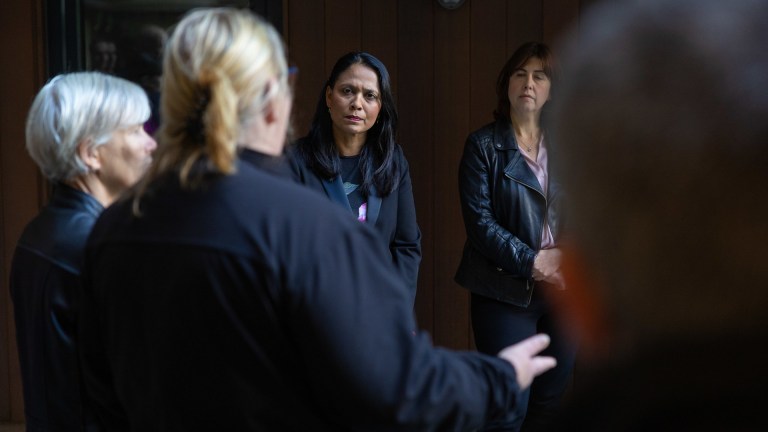The root causes of the riots remain. To destroy them, the government must be brave – it must rebuke the language that fans interpersonal racism and scrap the policies that perpetuate structural racism.
A new way of speaking about migration is fundamental. This became terrifyingly clear in August when party political slogans became the chant of people who publicly idolise Nazis.
Changing language will face a backlash from people whose political or economic existence depends on demonisation. Just look at how former ministers reacted to the use of “irregular” in a Home Office social media post about migration. Former home secretaries and Home Office ministers, including James Cleverly, Robert Jenrick and Priti Patel, piled onto social media to slur refugees and criminalise migration.
Through words, the former government’s strategy was to demonise and criminalise people. That all three became leadership candidates of the opposition tells us where they see political capital.
The rioters that terrorised people this summer don’t care that to seek safety all forms of entry into a country are protected under the Refugee Convention. They felt legitimised by ministers’ choice of language.
The new government has not stopped using “illegal”, but it must. And this should be just the start.
Advertising helps fund Big Issue’s mission to end poverty
It should start to acknowledge context when it talks about migration – to talk about how Britain’s colonial history and foreign policy have driven displacement, and why a small minority seek safety in the UK.
Refugee Action research found seven in 10 people who seek asylum here are from countries ravaged by the British Empire or UK foreign policy. Colonisation plundered wealth, but it exported English and British traditions and created migration routes. This context will help people answer, “why don’t they stay in France?”
The government must also be brave on policy. Because asylum and immigration policies are racially charged and must be explicitly identified as racial justice issues.
Backbenchers understand. In October, 25 Black, Asian and minority ethnicity MPs wrote to the home secretary to say immigration legislation “cannot be uncoupled from racism”.
They were responding to a Home Office report that said every immigration law between 1950 and 1981 was “designed at least in part to reduce the number of people with black or brown skin who were permitted to live and work in the UK”.
If a Home Office review can say this about legislation up to 1981, the Government must have the courage to order a review of legislation since 1981.
Advertising helps fund Big Issue’s mission to end poverty
Since 1992, there have been 13 new immigration laws, including three since 2022. Each reduced or removed the rights of migrants, including people seeking asylum. The government has signalled it may go down the same path of keeping people of colour out, not safe, by paying countries to stop refugees migrating to the UK.
Instead, ministers must show courage, repeal these laws and pledge no repeat in future policy or legislation.
Within the system, ministers must show bravery in how they house people seeking asylum.
They must acknowledge that migrants have been made the scapegoat for failures in housing policy in the past 40 years that have left a huge shortage of homes, especially social homes.
The government inherited a fractured system, with different policies for different groups of people. For people seeking asylum, housing is run by Home Office appointed contractors who maximise profits by sourcing the cheapest properties, usually concentrated in specific areas.
This allows government to segregate and house people seeking safety in a way they would never dream of doing with the wider population, such as in MOD camps or barges, or for years in a hotel.
Advertising helps fund Big Issue’s mission to end poverty
This government must work across departments to consider the needs of people in the asylum system alongside those of the rest of the population. This means scrapping the contractor model and letting local and regional bodies deliver housing.
Post-riots scrutiny of policing is important. But so is community resilience. During the 2010s, Refugee Action delivered community projects that built understanding and connections with impressive results. It’s vital there is investment in similar schemes. But they do not address the roots of racial injustice in society, politics or policy.
Community projects must come with a commitment to building racial justice through education, shifting language, and the desegregation and repeal of policies and laws that sustain injustice.
This will require bravery. The government will have to face down political opponents and media who see opportunity in division. It must make the case for a racially just immigration system based on rights. More of the same will lead to more of the same.
Tim Naor Hilton is chief executive of Refugee Action.
Do you have a story to tell or opinions to share about this? Get in touch and tell us more. This Christmas, you can make a lasting change on a vendor’s life. Buy a magazine from your local vendor in the street every week. If you can’t reach them, buy a Vendor Support Kit.
Advertising helps fund Big Issue’s mission to end poverty










